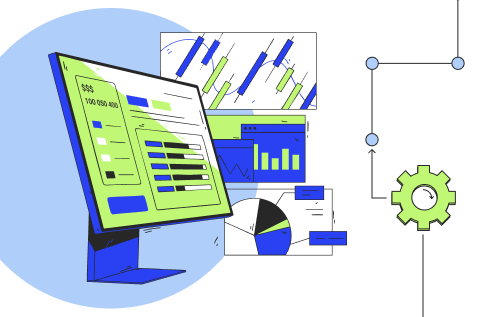The healthcare industry is experiencing an increasing demand for quality patient care, intertwined with financial and regulatory challenges. These growing complexities have driven healthcare organizations to search for innovative solutions that can streamline operations and optimize care delivery. At the heart of these solutions is automation.
Automation for healthcare operations, when strategically implemented, offers a range of benefits. These include elevated patient experiences, significant cost savings and enhanced compliance. Let's explore these advantages in more detail.
Streamlining workflow and improving efficiency
Efficiency lies at the heart of healthcare operations, with the power to influence patient outcomes and organizational success. Automating repetitive tasks can save valuable time, minimize errors and accelerate decision-making processes.
The ability to provide faster responses and more timely care can directly impact patient satisfaction and outcomes.
Automation also paves the way for more effective resource allocation. By handling routine tasks, automation enables healthcare organizations to focus their human resources on complex, high-impact activities. The result? An enhanced level of efficiency that allows providers to deliver exceptional care while maintaining competitiveness.
Elevating patient experience and outcomes
Quality patient care is the cornerstone of any healthcare provider’s mission. Data-driven insights, better communication among healthcare teams and faster access to care - all made possible through automation - significantly enhance patient experiences and outcomes.
As a result, investing in automation doesn’t just streamline processes; it contributes directly to happier, healthier patients.
Achieving cost savings and financial stability
Automation can lead to significant cost savings by reducing labor-intensive tasks, enabling resources to be reallocated to more strategic initiatives.
Moreover, improved revenue cycle management and billing accuracy can be achieved, reducing revenue leakage and enhancing financial performance.
A well-planned automation strategy can provide a substantial return on investment for healthcare organizations.
Ensuring compliance and managing risk
Healthcare organizations are often faced with stringent regulatory requirements and potential risks.
For example, compliance is a significant concern for healthcare organizations, which are bound by numerous regulations. Notably, the Health Insurance Portability and Accountability Act (HIPAA) safeguards both provider data and patient medical information. Noncompliance with HIPAA can lead to severe penalties, with fines ranging from $100 to as much as $100,000 per violation.
Automation serves as a potent tool in this regard. With automated systems, healthcare providers can automatically log every action, meticulously track and document activities - enhancing transparency and solidifying compliance with regulations, including HIPAA.
Intelligent automation can also aid in the proactive management of potential risks. With automated ongoing monitoring, healthcare organizations can foresee potential threats, fraud and help avert intended or unintended data breaches.
Enhanced data security measures help protect provider data and information, and proactive risk identification and mitigation can help providers - and provider groups - maintain compliance while protecting their reputation.
Embracing the future with automation
Automation is a strategic investment that can bring numerous benefits to healthcare operations, from enhanced efficiency and improved patient outcomes to cost savings and robust risk management. Investing in automation for healthcare operations pays off in numerous ways.
Choosing the right platform to implement this automation is crucial. Medallion, for example, has been noted for its capability to transform healthcare operations in various organizations, adding value in ways that align well with specific needs.
However, the key is to explore and choose a solution that best fits your unique situation. Embrace the future of healthcare with the right automation tool, and experience the transformative difference it can make for your organization.































